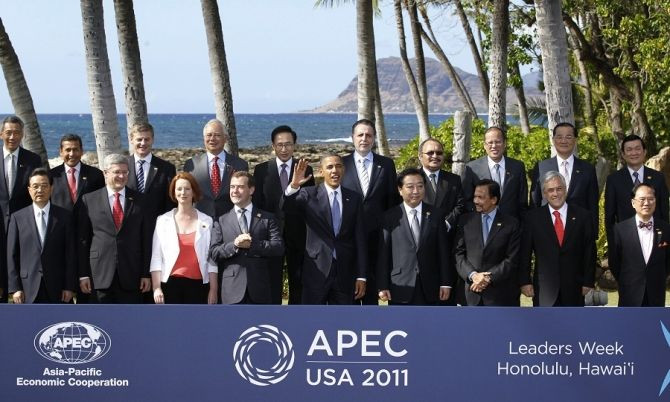Asia-Pacific Free Trade Vision in 'Beginning Stages'

Asia-Pacific leaders meeting in Honolulu over the weekend expressed a vision of a “truly seamless regional economy,” recognizing that it is “only in the beginning stages.”
The 21 countries which participate in the Asia-Pacific Economic Cooperation released a joint statement called the “Honolulu Declaration.
Member nations include Australia, Brunei Darussalam, Canada, Chile, People’s Republic of China, Hong Kong-China, Indonesia, Japan, Republic of Korea, Malaysia, Mexico, New Zealand, Papua New guinea, Peru, The Philippines, Russia, Singapore, Chinese Taipei, Thailand, The United States, and Viet Nam.
The region represents 44 percent of world trade and 55 percent of global economic output in 2010.
While the weekend meeting, which concluded Sunday, included leaders from the region, the statement also included the group's outlook for global talks on free trade.
The APEC countries said it was “unlikely in the near future” that a global trade deal would be reached. The global effort known as the Doha Development Agenda is being coordinated by the World Trade Organization. The Doha Round, as it is sometimes called, began in 2001. Since that time, tough disagreements have emerged between developed and developing countries.
The APEC countries said Sunday that possibilities for making progress on a global deal included “advancing specific parts of the Doha agenda where consensus might be reached on a provisional or definitive basis.”
Free Trade in the Region
The countries are seeking to establish a Free Trade Area of the Asia-Pacific.
“We have committed to taking concrete steps toward a seamless regional economy,” the countries stated Sunday.
The aim is to put in policies promoting non-discriminatory and market-driven rules. The countries said they agreed on areas of cooperation such as boosting participation of small and medium-sized businesses in global production chains.
Green Growth Agenda
By 2015, APEC countries said they will aim to reduced applied tariff rates to 5 percent or less on a list of “environmental goods” that will boost the group’s green growth and sustainable development objectives..
“Economies will also eliminate non-tariff barriers, including local content requirements that distort environmental goods and services trade,” the countries stated.
Other efforts
- Phase out inefficient fossil-fuel subsidies
- Promote energy efficiency
- Incorporate low-emissions development strategies
- Prohibit trade in illegally harvested forest products
Regulation
APEC noted that already in 2012, APEC was taking steps for a 2013 goal if improving regulatory practices within each ecnomy by:
- Ensuring internal coordination or regulatory work
- Assessing regulatory impacts
- Conducting public consultation
Other efforts include preventing trade barriers linked to green technology, strengthening food safety systems, and implementing anti-corruption and open government commitments.
Looking Ahead
The countries also said they would take steps to expanding economic opportunities for women, and also enhancing the role of the private sector in APEC. The countries also said they would seek to include the private sector and civil society more substantively in to emergency preparedness efforts.



























